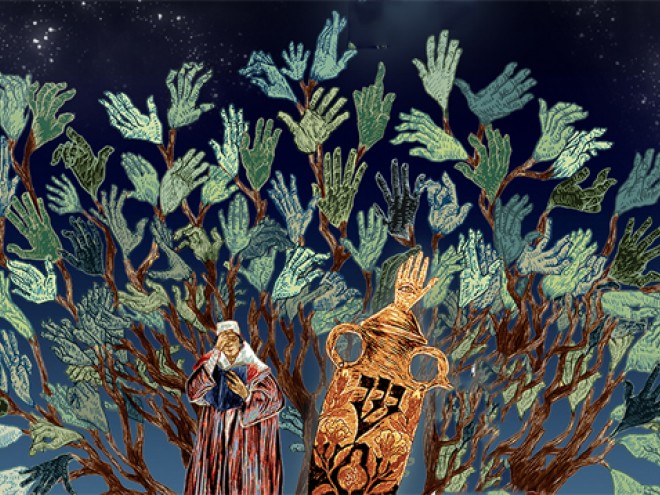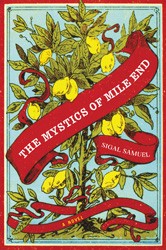Earlier this week, Sigal Samuel wrote about a key deleted scene to The Mystics of Mile End and envisioning a mystical experience for the twenty-first century against the traditions of Kabbalah. She is blogging here all week as part of the Visiting Scribe series on The ProsenPeople.
“Is your novel autobiographical?” That’s the question I (and probably all novelists) get asked most often. While I was in the process of writing The Mystics of Mile End, I would always answer “No.” Little did I know I was lying to people.
I thought I was writing a novel about a Kabbalah-obsessed family because my father was a professor of Kabbalah, which meant I’d grown up with easy access to Jewish mystical texts — simple as that. Only after I finished writing the book did I find out that my family’s Kabbalistic connection actually went much deeper — and much farther back. 
The realization came on Passover, when I went home to Montreal for a seder with my dad and my grandmother. She’s an Indian Jew, born and raised in Mumbai. I watched her take the seder plate’s egg and peel it with neurotic carefulness, making sure to capture every tiny bit of eggshell in a napkin. When I asked why she was being so insanely precise about it, she shrugged. “I don’t know,” she said, “it’s just something my mother and grandmother did, and I learned to handle food from them, so I do it, too.”
Meanwhile, my dad started smiling across the table. “I know why she does it,” he said. “It’s a Kabbalistic ritual.” He explained that her way of handling an egg was rooted in the mystical idea of the Shattering of the Vessels. According to the Kabbalists, when the light of the divine poured down into the ten vessels that gave rise to all of creation, the force of its holiness shattered them. Bit of the broken vessels went tumbling down into darkness, and that was the beginning of evil. My grandmother is careful not to let a single shard of shell escape because of a fear of letting evil into the world.
For a moment, I was dumbstruck. Then I said: “But, wait. Her mother and grandmother were not educated women, so how could they have known about this Kabbalistic idea?”
My dad looked surprised. “What do you mean? Don’t you know that your great-great-grandfather was a famous Kabbalist in Mumbai? That the Jews of the city would come to study mysticism with him? That his home was known as Beit Kabbalah, the House of Kabbalah? That legend has it he died when someone interrupted him in the middle of a dangerous Kabbalistic meditation practice?”
Well, no, I didn’t know — because nobody told me!
I spent a while feeling shocked (and, let’s face it, a bit ticked off) that they’d never bothered to tell me this cool bit of family lore. Then I realized that maybe it was my fault. After all, I’d never asked.
Now, I started asking, with a vengeance. I gathered up all my grandmother’s memories of life in India, got on a plane and flew to Mumbai.
On this trip, which I ended up chronicling for the Forward, I didn’t manage to find any tangible traces of my great-great-grandfather and his Beit Kabbalah. But I did find out that my great-grandfather had been a Freemason — and possibly also a Theosophist.
The Theosophists were a secret society that blended the mystical traditions of many religions, putting a heavy emphasis on Kabbalah. There were plenty of Jewish Theosophists in Mumbai in the early 1900s.  In 1925, they formed their own subgroup called the Association of Hebrew Theosophists, and their leader was Reuben Ani, a Jew related to me by marriage.
In 1925, they formed their own subgroup called the Association of Hebrew Theosophists, and their leader was Reuben Ani, a Jew related to me by marriage.
I started to become obsessed with the idea that my great-grandfather might have been a Theosophist. And so, eventually, I tracked down Mumbai’s contemporary Theosophical Society and crashed one of their meetings. Though they initially tried to shoo me away, they were impressed when they heard about my ancestry. They ended up initiating me into their secret society, calling me “Sister Sigal” and asking me to recite blessings in Hebrew.
In this way, writing my novel not only led me to discover my own family’s roots — it also led me on an obsessive Kabbalistic search that eerily resembles the search of my characters, collapsing the gap between them and me, between fiction and autobiography.
Sigal Samuel is an award-winning fiction writer, journalist, essayist, and playwright. Originally from Montreal, Sigal now lives and writes in Brooklyn. The Mystics of Mile End is her first novel.
Related Content:
Sigal Samuel is a Staff Writer for Vox’s “Future Perfect.” She writes about artificial intelligence, neuroscience, ethics, and the intersection of technology and religion. Previously, she was the Religion Editor at The Atlantic. Her award-winning journalism has also been published in outlets like BuzzFeed, The Daily Beast, The Rumpus, and Electric Literature. She has appeared on NPR, BBC, and CBC. Sigal’s novel, The Mystics of Mile End, tells the story of a dysfunctional family dealing with mysticism, madness, and mathematics in Montreal. It was nominated for the International Dublin Literary Award and won a Canadian Jewish Literary Award. Sigal earned her MFA in Creative Writing from the University of British Columbia and her BA in Philosophy from McGill University.




